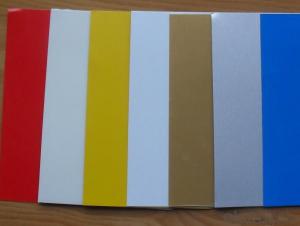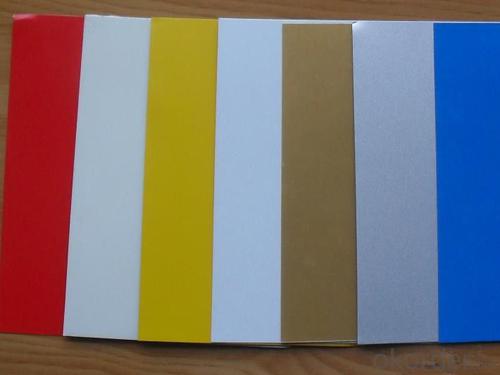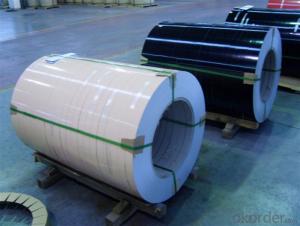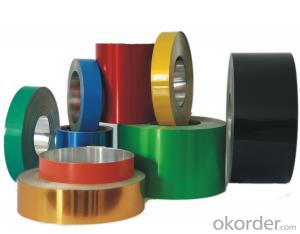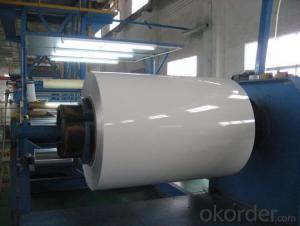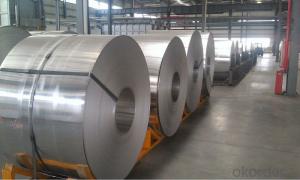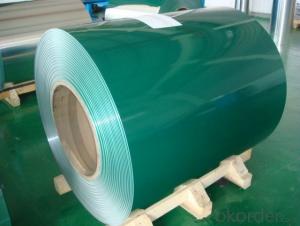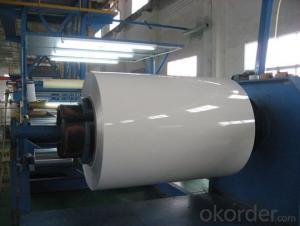RAL 9016 PE 18 Micros Coated Aluminum Coils Inc Tampa FL
- Loading Port:
- Tianjin
- Payment Terms:
- TT OR LC
- Min Order Qty:
- 2 m.t.
- Supply Capability:
- 40000 m.t./month
OKorder Service Pledge
OKorder Financial Service
You Might Also Like
Specification
Description
Grade
| 1000 Series: 1050 1060 1070 1100 1200 1235 etc. 3000 Series: 3003 3004 3005 3104 3105 3A21 etc. 5000 Series: 5005 5052 5083 5086 5154 5182 5251 5754 etc. 6000 Series: 6061 6063 6082 6A02 etc. 8000 Series: 8006 8011 8079 etc. |
Thickness | 0.05~10mm |
Width | <1600mm< span=""> |
Color | Metallic, Solid, RAL or by customer requirements |
Coating paint: | PVDF(Polyvinylidene Fluoride), PE(Polyester ) |
Coating thickness | as per customer’s request |
Gloss | 10-90%(EN ISO-2813:1994) |
Total coating thick | Polyester18~27micron(EN ISO-2360:1995) PVDF27 ~35micron(EN ISO-2360:1995) |
Coating hardness | 2H |
Protective film | PVC film, Colorless transparent or White-black |
Adhesion | 5B (EN ISO-2409:1994) |
Impact resistance | No cracking and peeling (A.S.T.M D2794-1993) |
Flexibility (T-bend) | 0T- 2T |
Temper | H16, H18, H24, H26, H26 |
Certification | ISO9001:2000, CE, SGS |
Coil's standard diameter | 1100mm |
Inner Diameter | 405mm/505mm |
Coil's standard weight | 2000kgs |
Payment | L/C ,T/T |
Chemical composition% | |||||||||
Grade | Si | Fe | Cu | Mn | Mg | Cr | Ni | Zn | Al |
1050 | 0.250 | 0.400 | 0.050 | 0.050 | 0.050 | - | - | 0.050 | 99.50 |
1060 | 0.250 | 0.350 | 0.050 | 0.030 | 0.030 | - | - | 0.050 | 99.60 |
1070 | 0.200 | 0.250 | 0.040 | 0.030 | 0.030 | - | - | 0.040 | 99.70 |
1100 | Si+Fe:0.95 | 0.05-0.2 | 0.050 | - | - | 0.100 | - | 99.00 | |
1200 | Si+Fe:1.00 | 0.050 | 0.050 | - | - | 0.100 | 0.050 | 99.00 | |
1235 | Si+Fe:0.65 | 0.050 | 0.050 | 0.050 | - | 0.100 | 0.060 | 99.35 | |
3003 | 0.600 | 0.700 | 0.05-0.2 | 1.0-1.5 | - | - | - | 0.100 | remains |
3004 | 0.300 | 0.700 | 0.250 | 1.0-1.5 | 0.8-1.3 | - | - | 0.250 | remains |
3005 | 0.600 | 0.700 | 0.250 | 1.0-1.5 | 0.20-0.6 | 0.100 | - | 0.250 | remains |
3105 | 0.600 | 0.700 | 0.300 | 0.30-0.8 | 0.20-0.8 | 0.200 | - | 0.400 | remains |
3A21 | 0.600 | 0.700 | 0.200 | 1.0-1.6 | 0.050 | - | - | 0.10 | remains |
5005 | 0.300 | 0.700 | 0.200 | 0.200 | 0.50-1.1 | 0.100 | - | 0.250 | remains |
5052 | 0.250 | 0.400 | 0.100 | 0.100 | 2.2-2.8 | 0.15-0.35 | - | 0.100 | remains |
5083 | 0.400 | 0.400 | 0.100 | 0.40-1.0 | 4.0-4.9 | 0.05-0.25 | - | 0.250 | remains |
5154 | 0.250 | 0.400 | 0.100 | 0.100 | 3.1-3.9 | 0.15-0.35 | - | 0.200 | remains |
5182 | 0.200 | 0.350 | 0.150 | 0.20-0.50 | 4.0-5.0 | 0.100 | - | 0.250 | remains |
5251 | 0.400 | 0.500 | 0.150 | 0.1-0.5 | 1.7-2.4 | 0.150 | - | 0.150 | remains |
5754 | 0.400 | 0.400 | 0.100 | 0.500 | 2.6-3.6 | 0.300 | - | 0.200 | remains |
6061 | 0.40-0.8 | 0.700 | 0.15-0.40 | 0.150 | 0.8-1.2 | 0.04-0.35 | - | 0.250 | remains |
6063 | 0.20-0.6 | 0.350 | 0.100 | 0.100 | 0.45-0.9 | 0.100 | - | 0.100 | remains |
6082 | 0.7-1.3 | 0.500 | 0.100 | 0.40-1.0 | 0.6-1.2 | 0.250 | - | 0.200 | remains |
6A02 | 0.50-1.2 | 0.500 | 0.20-0.6 | Or Cr0.15-0.35 | 0.45-0.9 | - | - | 0.200 | remains |
8011 | 0.50-0.9 | 0.6-1.0 | 0.100 | 0.200 | 0.050 | 0.050 | - | 0.100 | remains |
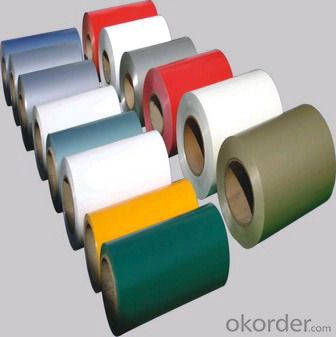
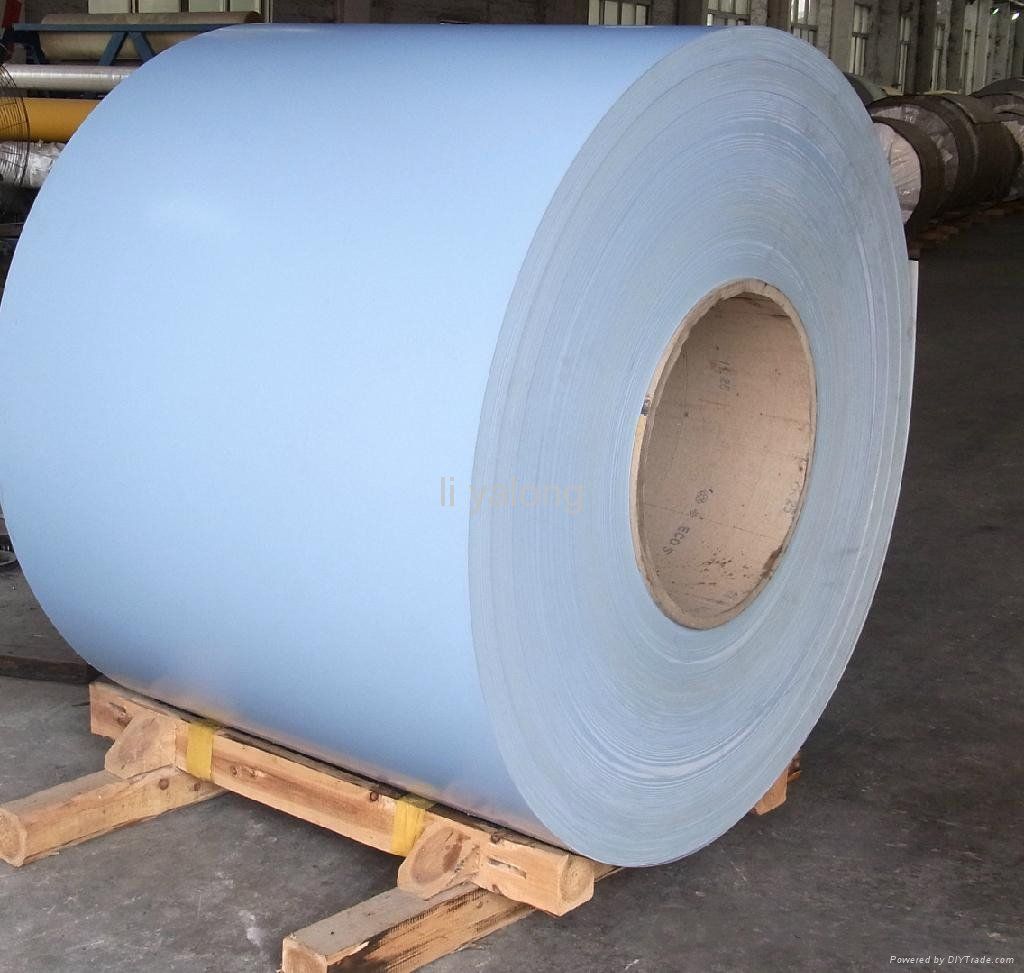
PE and PVDF Painting
Polyester Coatings (PE)
PE (polyester) coatings exhibit an excellent combination of hardness, flexibility, flow, appearance, and superior resistance to dirt retention in indoor and outdoor applications. These coatings are highly resistant to abrasion, metal marking, staining, and marring, and require minimal maintenance. Glazetech uses polyester paints which provide excellent colour and gloss retention properties.
Polyvinylidene Fluoride Coatings (PVDF)
PVDF (polyvinylidene fluoride) is a chemical resistant thick film barrier coating commonly used in architectural applications where both excellent appearance and substrate protection must be maintained over a long period of time. This coating is unaffected by most chemicals and solvents and has excellent wear and abrasion resistance. PVDF also has a high dielectric strength, excellent resistance to weathering and the ability to self extinguish.
Application
Widely used in manufacturing of products as well as other industrial applications like:
Products Materials: PP cap stock, the traffic sign, air-conditioner heat and exchangers, food container, household foil, pharmaceutical packing, cigarettes packing etc.
Building Materials: aluminum curtain wall base plate, ACP, aluminum, ceilings, aluminum sheets, honeycomb panels and aluminum roofing, lighting decoration, household electrical appliances, food package (such as pop can cover & ring-pull), furniture ect.
- Q: Can aluminum coils be used in aerospace heat exchangers?
- Yes, aluminum coils can be used in aerospace heat exchangers. Aluminum is widely used in aerospace applications due to its lightweight and excellent heat transfer properties. It offers good corrosion resistance, high thermal conductivity, and is cost-effective, making it a suitable material for heat exchangers used in aircraft and other aerospace systems.
- Q: Why is the hard drive made of aluminum? Why is steel not used, despite being cheaper?
- first I am guessing weight as there are 6 discs in there and just whipping them up to speed of 16000RPM takes some power. And the magnetic factor would play a roll at that speed and you would lose data.. It is not aluminum...it is aluminum alloy. Steel is not cheaper. And as temperatures change the steel would expand more than the aluminum alloy and you would lose your data as it has moved. Just a guess.
- Q: Explain how aluminum coils impact transportation, including considerations for logistics and safety.
- <p>Aluminum coils significantly affect transportation due to their weight and size. They are heavy and bulky, which requires specialized vehicles for transportation to ensure stability and prevent damage. The weight of aluminum coils can impact fuel efficiency and may require more powerful vehicles, increasing fuel consumption and emissions. Additionally, the transportation of aluminum coils must adhere to strict safety regulations to prevent accidents, especially when transported over long distances or on public roads. This can involve securing the load properly, using appropriate transport methods, and ensuring drivers are trained to handle heavy loads. The logistics of transporting aluminum coils can be complex, requiring careful planning and coordination to minimize delays and costs.</p>
- Q: How do aluminum coils contribute to sustainable energy systems?
- There are several reasons why aluminum coils are crucial in sustainable energy systems. Firstly, aluminum is a lightweight metal that conducts electricity well, making it ideal for producing coils used in renewable energy technologies like wind turbines, solar panels, and electric vehicles. By using aluminum coils, these systems become more efficient and perform better due to the reduced weight. Secondly, aluminum is abundant in nature and can be recycled multiple times without losing its original properties. This results in significant energy savings and less environmental impact. By using aluminum coils, sustainable energy systems can reduce their reliance on new materials and support a circular economy. Furthermore, aluminum coils are resistant to corrosion and have excellent heat transfer properties. This makes them highly durable and capable of withstanding harsh weather conditions, ensuring the longevity and reliability of renewable energy systems. The durability of aluminum coils also reduces the need for frequent maintenance or replacements, minimizing waste generation and conserving resources. Moreover, aluminum is a non-toxic material that poses minimal risks to human health and the environment. Unlike other metals, aluminum does not release harmful substances into the soil or water. This makes it a safe choice for sustainable energy systems. Lastly, the use of aluminum coils in sustainable energy systems helps to reduce greenhouse gas emissions. Due to its lightweight nature, aluminum requires less energy for transportation and installation, thereby reducing the carbon footprint associated with manufacturing and installation processes. Additionally, the increased efficiency and performance of renewable energy systems using aluminum coils contribute to the displacement of fossil fuel-based energy generation, leading to a decrease in overall carbon emissions. In conclusion, aluminum coils play a significant role in sustainable energy systems by improving the efficiency, durability, recyclability, and environmental friendliness of renewable energy technologies. Their lightweight nature, resistance to corrosion, and excellent heat transfer properties make them suitable for various applications. Additionally, their abundance and recyclability support resource conservation and a circular economy. By using aluminum coils, sustainable energy systems can reduce their environmental impact, enhance performance, and contribute to a cleaner and more sustainable future.
- Q: I was told today that taking aluminium inside your body greatly increases the chance of getting alzheimers as they destroy cells. Is this true?If so, then what foods contain aluminium?Thanks in advance :)
- It has been hypothesized that aluminium exposure is a risk factor for the development or acceleration of onset of Alzheimer disease (AD) in humans. The Aluminium could be found in bottled or treated tap drinking water and food additives. Aluminium is permitted as a food additive and is used in colourings, emulsifiers, stabilisers and anti-caking agents. Example of food containing aluminium additives includes processed cheese.
- Q: How are aluminum coils stored to prevent damage?
- Aluminum coils are typically stored in a controlled environment to prevent damage. The storage area should be clean, dry, and well-ventilated to avoid any moisture buildup that could lead to corrosion. The coils are usually stacked on pallets or racks to keep them off the ground and protect them from any potential damage from dirt, dust, or water. It is important to ensure that the storage area is free from any sharp objects or heavy items that could potentially dent or scratch the coils. Additionally, the coils should be stored in a way that prevents them from shifting or falling, which could cause deformation or other damages. Proper labeling and organization of the coils is also crucial to easily identify and access them without causing any harm. Overall, careful attention to storage conditions and handling practices is essential to maintain the integrity and quality of aluminum coils and prevent any potential damage.
- Q: What is the corrosion resistance of aluminum coils?
- Aluminum coils exhibit excellent corrosion resistance due to the formation of a protective oxide layer on its surface. This oxide layer acts as a barrier, preventing further corrosion and providing long-term durability. The corrosion resistance of aluminum coils is further enhanced through various surface treatments and coatings, such as anodizing or painting, which provide an additional layer of protection. This makes aluminum coils a reliable choice for a wide range of applications in industries such as construction, automotive, and aerospace, where resistance to corrosion is essential.
- Q: What is the thickness tolerance of aluminum coils?
- The thickness tolerance of aluminum coils varies depending on the grade and manufacturing process. Typically, aluminum coils have a standard thickness tolerance of approximately +/- 0.005 inches (+/- 0.13 mm). However, it is important to note that this tolerance can be further adjusted or refined based on the specific requirements of the customer and the capabilities of the manufacturer. Certain specialized aluminum coil manufacturers may offer even tighter thickness tolerances, usually around +/- 0.002 inches (+/- 0.05 mm), to cater to more precise or demanding applications. To ensure the desired thickness tolerance is met for a specific project or application, it is always recommended to consult with the manufacturer or supplier.
- Q: This question asks for criteria or methods to determine if an aluminum coil is of high quality.
- <p>To identify a good quality aluminum coil, consider the following factors: purity indicated by the alloy number, surface finish which should be smooth and free from defects, thickness consistency, and mechanical properties such as tensile strength and elongation. Check for certifications or quality standards compliance. Look for uniform color and absence of oil stains or rust. The coil should have precise dimensions and be free from dents or scratches. Additionally, consider the supplier's reputation and customer reviews.</p>
- Q: How do aluminum coils compare to copper coils in terms of performance?
- Aluminum coils and copper coils are two common types of heat exchanger coils used in heating, ventilation, and air conditioning (HVAC) systems. While both materials are effective in transferring heat, they do differ in terms of performance. Copper coils have long been the preferred choice for HVAC systems due to their superior heat transfer properties. Copper is an excellent conductor of heat, allowing for efficient transfer of thermal energy. This means that copper coils can cool or heat the surrounding air more effectively, resulting in faster and more efficient temperature control. On the other hand, aluminum coils are less efficient in terms of heat transfer compared to copper coils. Aluminum is a poorer conductor of heat, which means that it requires a larger surface area to achieve the same level of heat transfer as copper. Consequently, aluminum coils tend to be larger in size to compensate for their lower heat transfer capabilities. However, aluminum coils do have some advantages over copper coils. Firstly, aluminum is a lightweight material, making it easier to handle and install. This can be particularly beneficial in situations where weight restrictions or handling limitations are a concern. Secondly, aluminum coils are more resistant to corrosion compared to copper coils. Copper is prone to corrosion over time, especially in environments with high humidity or exposure to certain chemicals. Aluminum, on the other hand, naturally forms a protective oxide layer that helps prevent corrosion. This can result in longer-lasting coils and a lower likelihood of refrigerant leaks. In summary, while copper coils offer superior heat transfer capabilities, aluminum coils have their own advantages such as lighter weight and better corrosion resistance. The choice between aluminum and copper coils ultimately depends on the specific requirements of the HVAC system, including the desired performance, budget, and environmental factors.
Send your message to us
RAL 9016 PE 18 Micros Coated Aluminum Coils Inc Tampa FL
- Loading Port:
- Tianjin
- Payment Terms:
- TT OR LC
- Min Order Qty:
- 2 m.t.
- Supply Capability:
- 40000 m.t./month
OKorder Service Pledge
OKorder Financial Service
Similar products
Hot products
Hot Searches
Related keywords
